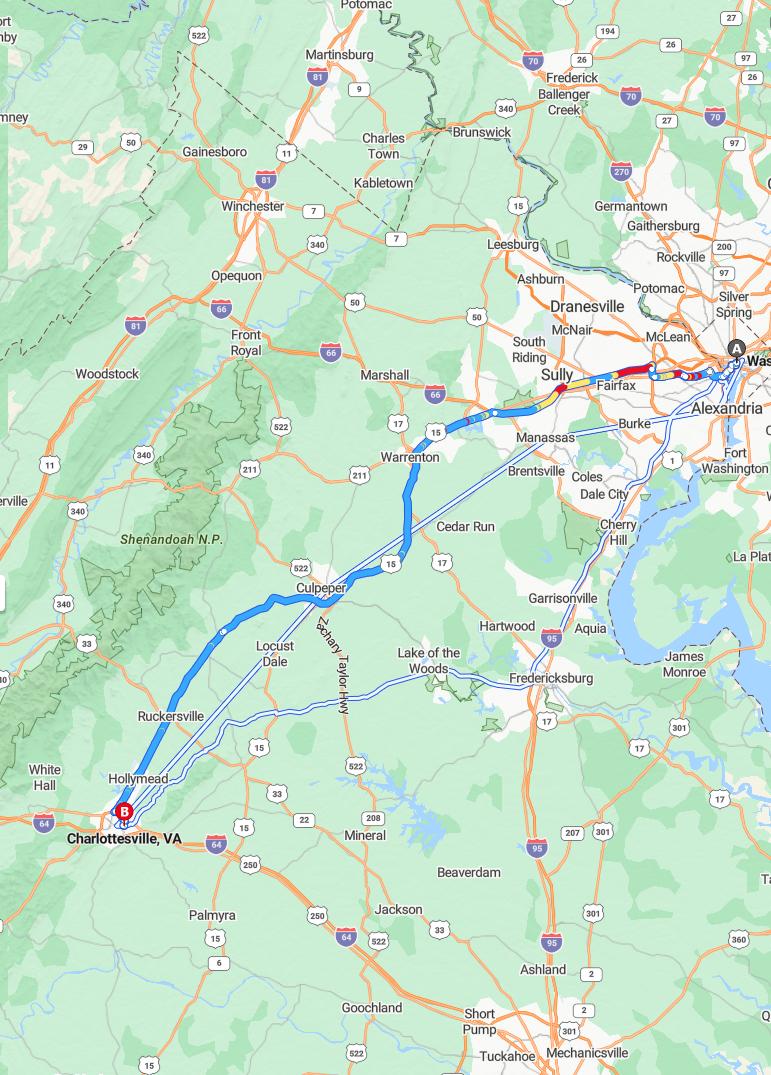Distance and estimated driving time
Driving from Washington to Charlottesville typically takes approximately 2 hours and 58 minutes, covering a distance of around 119 miles. The primary routes for this trip include I-66 West and US-29 South, ensuring a relatively direct and efficient journey. Travelers should be aware of potential traffic conditions, especially during peak hours, which might affect the estimated travel time. Planning ahead can help optimize your trip, offering a smooth and timely arrival in Charlottesville.
Driving route
Traveling from Washington to Charlottesville offers a scenic journey through Northern Virginia's diverse communities. Starting in Washington, DC, you will pass through Alexandria and Fairfax, both rich in history and vibrant city life. Continuing southwest, the route takes you through Sully, Manassas, and Warrenton, renowned for their historic significance and charming town centers. As you approach Culpeper and Ruckersville, the scenery becomes more rural, with lush landscapes and rolling hills. Finally, the drive concludes in Hollymead and Charlottesville, known for their cultural attractions, educational institutions, and picturesque surroundings, making for an enjoyable and memorable trip.

Traffic conditions and peak hours
Traveling from Washington, DC to Charlottesville typically involves passing through several busy areas such as Alexandria, Fairfax, and Manassas, which can experience heavy traffic during peak hours. Rush hour traffic generally occurs from 7:00 AM to 9:00 AM and 4:00 PM to 7:00 PM on weekdays, leading to potential delays, especially near major urban centers. The stretch through Warrenton and Culpeper can also be congested during weekends or holiday seasons when travelers head to Virginia's scenic destinations. To avoid delays, travelers should consider departing outside of peak hours or checking current traffic updates before starting their journey.
Scenic points of interest along the route
The drive from Washington to Charlottesville offers numerous scenic points of interest that captivate travelers. As you leave Washington, D.C., and pass through Alexandria, enjoy views of historic Old Town with its charming waterfront. Approaching Fairfax and Sully, the lush expanses of Northern Virginia's forests provide a verdant backdrop, while the countryside around Manassas features rolling farmland and Civil War landmarks. Near Warrenton and Culpeper, scenic vistas of the Blue Ridge Mountains begin to emerge, culminating in the picturesque Hollymead and Charlottesville areas, where breathtaking mountain views and vineyard landscapes create a truly memorable journey.
Rest stops and service areas
When traveling from Washington to Charlottesville, there are several convenient rest stops and service areas along the route. Drivers can find facilities in key locations such as Alexandria, Fairfax, and Manassas, offering restrooms, fuel, and refreshments to recharge before continuing their journey. Additionally, service stations near Warrenton and Culpeper provide ample parking and amenities to ensure a comfortable break. These designated areas help travelers maintain their energy and drive safely through the scenic Virginia countryside.
Weather forecast for the travel day
The weather forecast for the day of travel from Washington to Charlottesville indicates generally mild and manageable conditions. Travelers can expect partly cloudy skies with daytime temperatures ranging from the high 60s to low 70s Fahrenheit. There may be some light rain or drizzle in the early morning hours, but the weather is expected to clear up as the day progresses. Overall, the conditions should be suitable for a smooth drive along the route, with no significant weather-related disruptions anticipated.
Fuel stations comparison and prices
When driving from Washington to Charlottesville, travelers will find a variety of fuel stations along the route, primarily consisting of major brands like Shell, BP, and Exxon, which offer consistent quality and service. Fuel prices can vary significantly depending on location, with stations near Washington generally charging higher prices due to higher demand and operational costs. As you progress through towns such as Alexandria, Fairfax, and Manassas, prices tend to decrease slightly, providing more economical options for refueling. Close to Charlottesville, several stations in Hollymead and Warrenton offer competitive rates, making it a good opportunity for travelers to save, especially after a long drive through northern Virginia.
Vehicle preparation tips for long-distance driving
Before embarking on a long-distance drive from Washington to Charlottesville, it's essential to prepare your vehicle to ensure safety and comfort. Check the tire pressure, tread, and fluid levels, including oil, coolant, and windshield washer fluid, to prevent any unexpected breakdowns. Ensure your brakes and lights are functioning properly, and keep an emergency kit with first aid supplies, roadside assistance contact information, and basic tools on hand. Additionally, verify that your navigation system or maps are up-to-date, and plan for regular breaks to stretch and rest, making your journey smooth and enjoyable.
Recommended meal and snack options en route
As you drive from Washington to Charlottesville, it's essential to plan your meals and snacks to stay energized. In Alexandria or Fairfax, consider grabbing a fresh sandwich or a salad from a local cafe for a satisfying lunch. Throughout the journey, pack portable snacks like trail mix, granola bars, and fresh fruit to maintain your energy levels. Once you reach Ruckersville or Hollymead, you might enjoy a hearty meal at a regional restaurant or pick up some baked goods to satisfy your cravings before arriving in Charlottesville.
Safety tips and emergency contact information
When driving from Washington to Charlottesville, it is essential to prioritize safety by staying alert and obeying traffic laws throughout the journey. Make sure your vehicle is well-maintained, with functioning lights, brakes, and tires, to prevent breakdowns or accidents. Keep emergency supplies such as a first aid kit, flashlight, and bottled water in your car, and ensure your phone is charged in case you need to contact emergency services. In case of an emergency, dial 911 for immediate assistance, and keep local numbers for roadside assistance or your insurance provider readily available.
